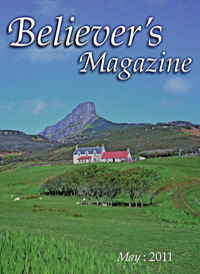The Recognised Priest (Heb 5.5)
The writer, in taking up the high priestly office of our Lord Jesus Christ, gives us the third occasion for the quotation of Psalm 2.7 in the New Testament: "Thou art my Son, to day have I begotten thee". As previously noticed, this quotation in Acts 13.33 refers not to His incarnation or His resurrection, but rather to the day commencing His unique ministry to His own in a public way. The quotation in Hebrews 1.5 has reference to His resurrection in power as the great sin-purger and His acknowledged superiority over created angels. However, when we come to chapter five of this profound epistle we will notice that God is making known that the Mediator had received a divine commission and therefore was possessed of all essential authority for His office. Since Christ’s sufficiency as priest lies in His divine nature, God hails Him as "my Son". The same God who saluted Jesus as Son has also extolled and honoured Him as perpetual High Priest. The words "to day" speak of the day of His enthronement.
In bringing before us the priestly office of our Lord, the writer gives us a description of the Aaronic priest (Heb 5.1-4) and then proceeds to show us the fitness of Christ as priest (Heb 5.5-10), showing that in both there are two similar qualifications. First, they must be called of God and divinely appointed to the office. Second, they must be able to sympathise with the people. These Christ perfectly filled. Having become incarnate, thus a sojourner here, His capacity for sympathising became unequalled, for in His holy humanity He was exposed to all the trials and sorrows of this life as we are. We trace His path with great delight.
Galilee: His pathway and patience (4.15)
He is a High Priest that is touched with the feelings of our infirmities (weakness), because "in all points tempted like as we are, yet without sin (sin apart, JND)". The word "touched" (sumpatheo) is the thought of a person being able to sympathise by reason of a common experience. In impeccable humanity He has trodden the path before us. Be of good cheer, He knows the way that we take and His heart overflows in sympathy to us. Blessed Man, wondrous Priest!
Gethsemane: His passion and prayer (5.7)
What sorrows filled His holy soul as He crossed the brook and entered into the garden! "Who in the days of his flesh, when he had offered up prayers and supplications with strong crying and tears unto him that was able to save him from (out of) death, and was heard in that he feared." The supreme moment for Him as a Man had now come! He was prepared to enter the deep, deep waters of death and experience, for the first time, complete alienation from His God. What agony! What depth of humiliation as He lies prostrate on the ground! What a unique word the Spirit employs in describing His pleas, translated "supplications" in our Bible. This is the only time in the New Testament this particular word is used. It means, "humble, lowly, pitiful pleadings, beggings". Behold His earnest entreaties, His agonised crying and unrestrained tears and confess like the hymn writer:
Gethsemane can I forget?
Or there Thy conflict see,
Thine agony and blood-like sweat,
And not remember Thee?
-James Montgomery
Golgotha then glory: His propitiation, perfecting and priesthood (5.8-10)
"Thou art my Son, to day have I begotten thee" (v.5). God publicly and formally owns Him as the incarnate Son, perfectly fitted officially by reason of His experience (v.8) to commence His unique priestly ministry. God not only announces the priesthood of Christ in the Psalm 2.7 quotation, but He also, in v.6, proclaims the kingship of His Son in the Psalm 110.4 quotation which links itself to the quotation from that very Psalm in Hebrews 1.13. Thus the priestly and royal features of the Messiah are combined. In all of Israel’s history, high priesthood was never combined with kingship. No king ever entered the Holiest of All, but our blessed Lord has risen from the abyss (Rom 10.7, RV) and passed through the heavens, right into the immediate presence of God to commence a far greater priestly ministry than Melchisedec or Aaron and his successors ever experienced. God salutes Him: "Thou art my Son, to day have I begotten thee".
"Seeing then that we have a great high priest…Let us therefore come (draw near) boldly (with confidence) unto the throne of grace, that we may obtain mercy, and find grace to help (us) in time of need (in the nick of time)" (4.14,16). The help that will alleviate the need of the moment is readily available. In our sojourn, how often moments of extreme temptation assail us, but how good to know that immediate help from the throne is available to overcome. "Let us therefore come boldly", meaning, "Let us draw near with liberty", which is in the present tense, indicating that the privilege is always available.
Ah! whither could we flee for aid,
When tempted, desolate, dismayed,
Or how the hosts of hell defeat,
Had suff’ring saints no Mercy-seat?
-Hugh Stowell
Let us be thankful to God for One who bears gently with us (5.2, RV), who is full of sympathy for us, and who can meet our need immediately, no matter what the circumstances might be.
To be continued.









